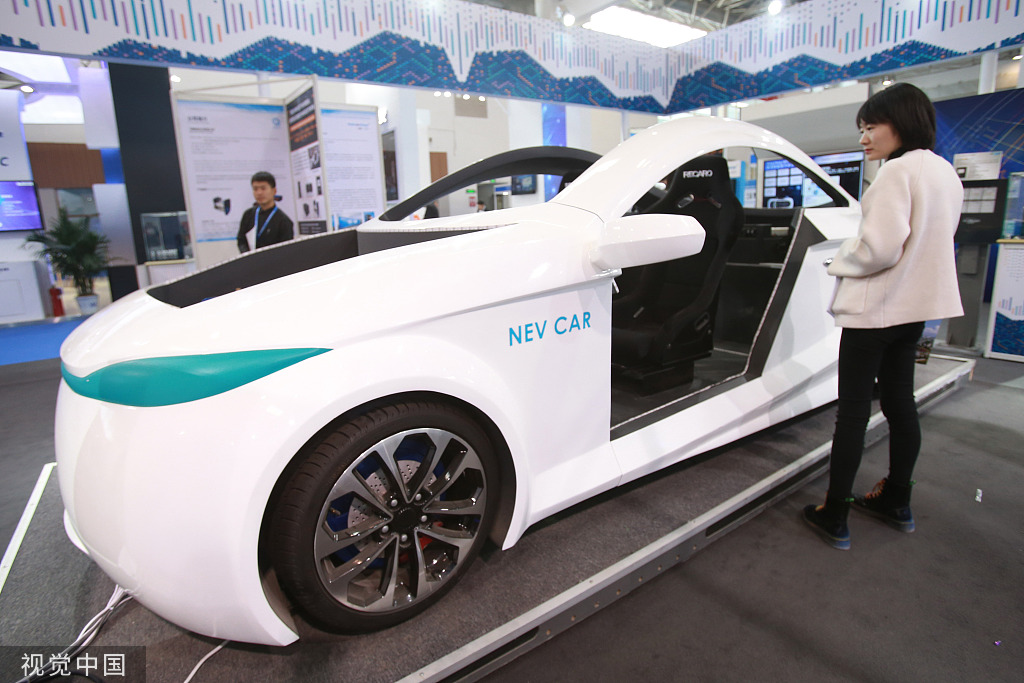Industry group predicts more precipitous drop in NEV sales


Subsidy cuts said to be discouraging buyers from shelling out for electric car
Sales of new energy vehicles are likely to see negative growth this year in the world's largest vehicle market, said the China Association of Automobile Manufacturers. The sector has plunged for four consecutive months since the Chinese government cut subsidies in June.
According to statistics released by the CAAM last week, the NEV sales were 75,000 units in October, slumping 45.6 percent yearon-year.
Total sales of the first 10 months reached 947,000 units, only accounting for 63 percent of CAAM's predictions from earlier this year.
The association said results were hurt by direct cuts to government subsidies and the impact has been beyond their imagination.
China has slashed NEV subsidies by 50 percent since July and plans to phase out all subsidies by the end of 2020. The policy change weakens carmakers' enthusiasm to large-scale production and promotion of NEVs, the association said.
Chen Shihua, an assistant to the CAAM's secretary-general, said the recovery of production and sales is still limited because of the pressure on new energy automakers to upgrade their technology. Insufficient demand of the domestic market is also factored.
"Based on the current developing trend, we may see negative growth for NEVs this year," Chen said.
Xu Haidong, another assistant to the CAAM's secretary-general, said he believed the NEV sector will recover next year.
He said subsidy policies help to accelerate the construction of electric vehicle infrastructure and cultivate a large army of domestic electric startups. The current situation provides an opportunity to begin reflection after the high growth.
There will be more fierce competitions in the Chinese electric vehicle market as global auto giants like Volkswagen, BMW, Daimler and Tesla start to produce electric models in China. It will be a great challenge for domestic electric startups to survive in the market, Xu added.
Chinese car maker BYD reported it sold 12,567 NEVs in October, slumping 55 percent year-on-year.
The trend has remained depressed in the whole new car market falling for 16 consecutive month. Last month, the sales declined 4 percent from the same month a year earlier, reaching 2.28 million units.
The sales of the first 10 months of the year totaled 20.65 million units with a 9.7 percent year-on-year decline.
Chen said the overall market didn't show obvious improvement since July last year, though the sector has entered the traditional peak season, the growth is not as fast as expected.
The association scaled down the estimate of this year's sales to an 8 percent drop to 26 million.
In terms of segments, passenger cars accounting for majority of the auto sector decreased 5.8 percent year-on-year to 1.93 million. The only highlight was the commercial vehicles, which showed an increase of 7 percent in October to 357,000 units.
According to the CAAM, sales by Chinese brands were down 9.6 percent at 770,000 in October. Their market share declined 1.7 percentage points year-on-year to 39.9 percent. Only three of China's top 15 passenger car makers by sales saw increases from January to October: Great Wall Motors, Chery and FAW.
Great Wall Motors said it sold 115,015 new cars in October, increasing 4.48 percent year-on-year, and 15 percent compared to September.
According to Geely, the carmaker sold 130,180 units last month with a slight increase of 1 percent year-on-year. Their total sales of the first 10 months reached 1.09 million.
SAIC Motor, China's largest carmaker by sales, reported a decline of 9.55 percent year-on-year in October to 544,400 cars.
In the first 10 months, its sales were slashed 13.74 percent to 4.96 million units.




































